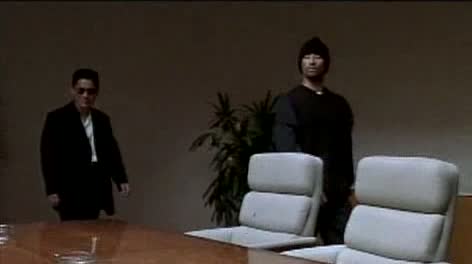Réalisation:
Takeshi KitanoScénario:
Takeshi KitanoPhotographie:
Katsumi YanagijimaMusique:
Joe HisaishiActeurs·trices:
Takeshi Kitano, Omar Epps, Kurōdo Maki, 加藤雅也, Susumu Terajima, Royale Watkins, Ren Ōsugi, Ryō Ishibashi, James Shigeta, Tatyana Ali, Amaury Nolasco (plus)Résumés(1)
Pour ne pas se soumettre au clan qui a tué son boss, Yamamoto (Takeshi Kitano), un yakuza de Tokyo, retrouve son jeune demi-frère, Ken (Claude Maki), à Los Angeles. Celui-ci a arrêté ses études pour devenir dealer. Il présente Aniki, "son grand frère", à sa bande. Débarqué aux Etats-Unis sans parler un mot d'anglais et confronté à une culture qui lui est totalement étrangère, Yamamoto reconnaît Denny (Omar Epps), un gangster afro-américain qu'il a balafré dans la rue. Malgré une certaine méfiance au départ, une amitié inattendue s'instaure entre les deux hommes, Denny étant le seul à comprendre réellement le code d'honneur des yakuzas. Rapidement, Yamamoto retrouve la vie criminelle qu'il menait au Japon. Il prend la tête du gang, supprime le fournisseur de Ken et donne une leçon à un gang chicano qui voulait quitter son territoire. Le business est florissant, le gang en pleine expansion, le yakusa et ses hommes finissent même par s'allier avec leur rival japonais pour s'agrandir. Mais après son refus de traiter avec la mafia, Yamamoto va engager une nouvelle guerre qui s'annonce sans pitié. (texte officiel du distributeur)
(plus)Critiques (4)
A classic Kitano film. At first, it has the pace of a snake charmer, but it all hangs on the viewer's willingness to accept Kitano's traditional game of breaking genre schemes. If you expect the story to be told to America by the fleeing Yakuza killer at a dynamic pace, you will soon be disappointed. Rather than a story, Kitano notices the characters, relishing situations that would be secondary in the action film genre (background, relationships) and seemingly key epic scenes are edited in surreal abbreviations. His lyricizing manuscript illogically recalls the rough-tender Kikujiro's Summer. A clear demonstration of how much this distinctive creator cares about NARRATED, gourmet (and perhaps a little ruthlessly) enjoyable subjective portrayal. The fact that the characters are different than one would expect by convention will only surprise those unfamiliar with Kitano. The same goes for the fact that the ruthless killer Brother (Kitano himself) hides another being under the mask, too. But it still works. Unlike Quentin Tarantino, Kitano doesn't make ubiquitous brutality a self-purpose poetic, but portrays it as the cold reality of gangster life... A cold reality that will eventually knock everyone's head off. A Japanese Godfather or a frantic gangster fugue, you'd like to write. But Kitano defies generalization. Brother will delight the audience with at least Joe Hisaishie’s excellent soundtrack... Those who like Kitano will enjoy almost everything about the film.
()
A raw gangster film by Takeshi Kitano. It is excellent but leaves an aftertaste of a somewhat unfinished product.
()
A very slow start, followed by a sharp rise below the peak where a fall awaits. You just know it's coming and it's going to be a hellish crash, so why run? Just laugh! Despite the long running time, it's worth sticking out through the end of the film because it's typically Japanese. That's probably why I liked it so much. Thanks to this film, I'm slowly starting to fall in love with Takeshi Kitano's work. Slowly but surely :-) What bothered me a bit were the quiet spots in the film – and I mean that literally. Those places where nothing was said and the music was silent too. It's not an action movie, it definitely won't inject adrenaline into your veins, but in the end there’s no shortage of dead people.
()
Takeshi’s trip to America turned out pretty well. The slow tale of the fate of a banished Yakuza and how he gets by in unfamiliar environment contains Kitano’s classic thoughtful and artistic elements. He deals with all problems that life throws at him with an unchanging expression. The personality cult reaches its peak here. A nice mix of comedy, action and drama. I understand "fucking Jap," asshole!
()

